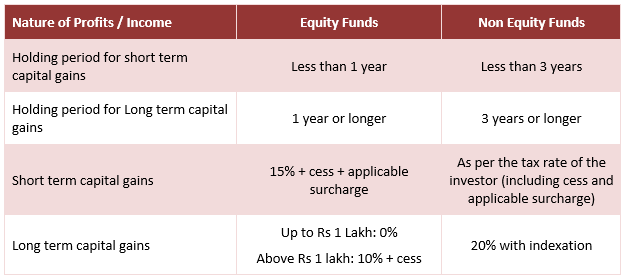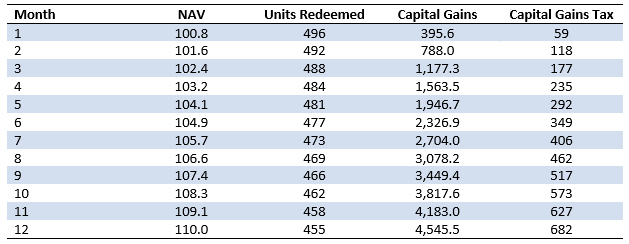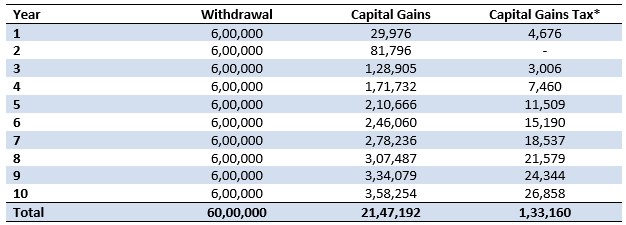
Leveraging the PSU rally to sustain capex growth
Indian equities are one of the brighter corners of sunshine in the global m...

Systematic Withdrawal Plan (SWP) and Systematic Transfer Plan (STP) are mutual fund facilities which offer solutions to different investment needs. SWP provides fixed cash-flows to investors. STP enables investors to transfer fixed amounts at regular intervals (e.g. weekly, monthly, etc.) from one scheme (usually low volatility scheme) to another scheme (high volatility). In this article, we will discuss the taxation of SWP and STP.
It is important for investors to understand that both SWP and STP transactions are considered to be redemptions for tax purposes. Each SWP instalment is a straightforward redemption; the asset management company (AMC) will redeem certain number of units based on prevailing net asset value (NAV) to generate the SWP cash-flows for you. STP is essentially a series of switches from one scheme to another scheme. For tax purposes, a switch is considered to be a redemption and re-investment. You should know that any redemption may lead to capital gains tax incidence depending on whether you have made a profit or loss on the redemption of units.
Capital gain is the appreciation in the value (redemption value – purchase value) of the units of a mutual fund that are redeemed. Investors should know that capital gains are taxed only at the time of redemption or sale. In other words, capital gains tax is levied only on realized gains. If your mutual fund units have appreciated in value and you are still holding them, then there is no taxation on the unrealized gains.
Capital gains can be either without indexation or with indexation depending on the type of scheme and holding period.
We will discuss capital gains with indexation in more details later in this article.
If redemption of units for SWP or STP results in capital gains then it will lead to a capital gains tax incidence. In other words, you may have to pay tax on your capital gains. The capital gains tax rate will depend on the holding period of the units i.e. how long you had held the units before you redeemed, amount of capital gains and type of scheme. For tax purposes there are two types of schemes – equity and non-equity. Capital gains taxation is different for equity and non-equity funds. Before we delve into the details of capital gains taxation let us understand what equity and non-equity funds are.

Let us understand this with the help of an example. Let us assume you invested Rs 50 lakhs in an equity fund at the beginning of a financial year (i.e. 1st April). The purchase NAV of your scheme is Rs 100. You are withdrawing Rs 50,000 every month through SWP. The annualized return of your scheme is 10%. For the sake of simplicity, we will ignore exit load and tax surcharge. The table below shows your SWP cash-flows and taxation for the first 12 months (short term capital gains tax).

Source: Advisorkhoj Research based on above assumptions
The table below shows the capital gains taxation of your SWP over tenure of 10 years. From year 2, SWP will attract long term capital gains tax

Source: Advisorkhoj Research based on above assumptions.*Includes 4% education cess
Like SWP, Let us understand STP with the help of an example. Let us assume you invested Rs 10 lakhs in a debt fund at the beginning of a financial year (i.e. 1st April) and are transferring Rs 166,667 every month to an equity fund i.e. your STP tenure will be around 6 months. In the 7th month you will switch all the balance units in your debt fund to the equity fund. The purchase NAV of your scheme is Rs 100 and the annualized return of your scheme is 5%. The purchase NAVs of the target scheme (transferee scheme) i.e. equity fund or the returns of target scheme (transferee scheme) returns are irrelevant for tax calculations. Again for the sake of simplicity, we will ignore exit load and tax surcharge. Let us assume that you are in the highest tax bracket i.e. 30%. The table below shows your STP cash-flows and taxation.

Source: Advisorkhoj Research based on above assumptions.*Includes 4% education cess
In this example, since the STP is taking place from a debt fund, short capital gains taxation of non equity funds will apply. We had discussed earlier that short term capital gains (holding period of less than 36 months) in debt funds are taxed as per the income tax rate of the investor.
In this post, we have discussed how SWP and STP are taxed. When filing your ITR, you should carefully go through all the mutual fund transactions made during the financial year, note all the redemptions,including your SWP and STP transactions to calculate the capital gains correctly. You can get your capital gains statements online from Registrar and Transfer Agents (RTAs). You can also ask your mutual fund distributor to provide you with one. You should disclose your capital gains and dividends in your income tax returns and pay taxes accordingly. If you are in any doubt you should consult with your tax consultant.
Mutual Fund Investments are subject to market risk, read all scheme related documents carefully.








































